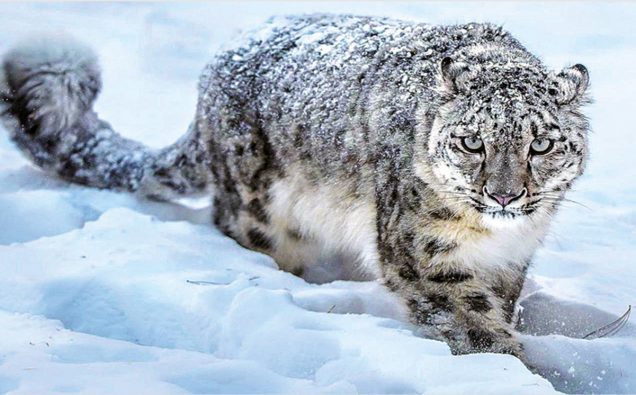
The appearance of exotic big cats in Pakistan‘s northern mountainous regions has excited Nature lovers but experts say a painstaking effort to save snow leopards is facing disruption under coronavirus outbreak.
United States Principal Deputy Assistant Secretary for South and Central Asian Affairs Alice Wells hailed the wildlife scientists of Pakistan and Uzbekistan for conservation of the rare snow leopards.
“Excited to see snow leopards on tracking cameras, thanks to wildlife conservation scientists from Pakistan to Uzbekistan — a positive sign their populations are rebounding,” Wells posted on Twitter.
Wells who is being replaced by Thomson L Wajda as top U.S. diplomat for South Asia on May 22, said the United States would continue to support conservation of ‘our planet’s most threatened species”.
The snow leopard, a large cat native to the mountain ranges of Central and South Asia, is listed as “vulnerable” on the International Union for Conservation of Nature’s red list.
The global population of snow leopards is estimated to less than 10,000 mature individuals and is expected to decline around 10 percent by 2040. In Pakistan, the snow leopard is found in the Hindu Kush and Karakoram region of Khyber Pakhtunkhwa, Gilgit-Baltistan and Azad Kashmir with an estimated population of around 200-420, according to the Snow Leopard Trust.
Wild animal experts believe that increasing reports of snow leopard sightings in Pakistan show that conservation efforts there are working.
But the COVID-19 crisis is threatening the success of the effort in the northern mountains. The nonprofit Baltistan Wildlife Conservation and Development Organization (BWCDO) has worked for more than 20 years to save the endangered cats. The BWCDO partners with several American charities on the effort.
Excited to see #snowleopards on tracking cameras thanks to wildlife conservation scientists from #Pakistan to #Uzbekistan–a positive sign their populations are rebounding. The US will continue to support conservation of our planet's most threatened species. AGW pic.twitter.com/sMwGCYx2fL
— State_SCA (@State_SCA) May 5, 2020
Ghulam Muhammad leads the organization. He says it is working with the United States-based Iqra Fund on conservation education programs for Gilgit-Baltistan communities.
But the new coronavirus pandemic has affected financial support for these projects. Ghulam Muhammad said this may be harmful to the snow leopard conservation campaign.
Last month, BWCDO and The White Lion Foundation (TWLF) of Britain released a video of the call of a wild snow leopard in Pakistan’s Karakorum mountains.
John Knight from TWLF said, “The adult male is exercising his vocal calls to establish territory and to let females know he is in the area.”
Knight added that the video is “extremely unusual” because snow leopards are naturally private creatures. They only come together to mate and raise their young.
Ghulam Muhammad said the video was recorded in February by cameras set up to observe the wild snow leopard population in the area. His team reported seeing a mother cat and her two young the following month.
— Ghulam Mohammad (@gmsadpara) April 10, 2020
The BWCDO leader said, “A mother and two cubs, especially so late in the season, tells us that snow leopard numbers are growing and that our method of creating a means for local communities to benefit from conservation are at the very least promising, and at best, successful.”
BWCDO is helping villagers build secure barriers to reduce snow leopard attacks. The organization also provides farm animal vaccination programs to reduce loss.
Researchers say the BWCDO’s work has helped protect and conserve a population of large wild goats called markhors. They also live in the high mountains of northern Pakistan.
Snow leopards hunt markhors. If there are enough markhors, the big cats will be less likely to kill farm animals for food.
Many of the big cats are killed by farmers in retaliation for livestock losses which is why TWLF works in conjunction with local villages and the Baltistan Wildlife Conservation and Development Organisation (BWCDO) to help put measures in place to reduce clashes between leopards and people. Predator-resistant corrals have already proven effective in keeping livestock safe from opportunistic leopards.















Thank you very much for enlightening me, and most importantly, just in time. Just think, six years already in the Internet, but this is the first time I hear it.